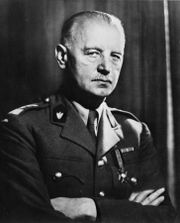
Born: May 20, 1881, Tuszow Narodowy, Austro-Hungarian partition of Poland (presently Poland)
Died: July 4, 1943, Gibraltar, Great Britain
Early days. Father : Tomasz Sikorski (coat-of-arms Kopaszyna), professor, mother – Emilia Habrowska.
Higher education. Marriage. Studies at Lwow Polytechnic. In his later life his technical qualifications as a road and bridge builder were a great help.
Marries Olga Helena Zubrzewska.
Attends Austrian Military School and gets diploma of an officer in the Austrian army.
Legiony. At the outbreak of war in 1914, a National Committee was formed in Cracow which soon afterwards led to the organization of the Legions of Joseph Pilsudski, and in that Committee, thirty-three-year-old Colonel Sikorski became chief of the military department and immediately began to act with dynamic energy.
He fought for the liberation of Lwow and Przemysl in 1919. He was not only a victorious general in the front lines, but he also became a prominent organizer of the young Polish army during the post-war period, when he was chief of the General Staff. In 1920 he was the commander of the Polish 5th Army. He described this campaign in his book “Nad Wisla i Wkra.”
Head of the government. In 1922, internal political conflicts in Poland put Sikorski at the head of the government. Within a short time he carried out essential reforms and guided foreign policy into a direction which gained the approval and co-operation of the League of Nations, while he also obtained recognition of Poland's Eastern frontiers by Great Britain, France and the U.S.A. As a Prime Minister he won universal respect and popularity in Poland.
He was a democrat and a supporter of the Parliament. He was a prominent theoretician and his vision of the forecoming European conflict is similar to works of the general Charles de Gaulle. During 1922-1925 he hold various governmental posts.
Dismissal by Pisudski. In 1928 Marshal Pilsudski dismissed him from public service.
Prime Minister in Exile. In 1939 after the German conquest of Poland, Sikorski became prime minister of the Polish government in exile. He also was commander in chief of the Polish forces that fought alongside the Allies in World War II. Sikorski restored (1941) diplomatic relations with the USSR, but after he requested International Red Cross investigation of the Katyn incident, relations were again broken off (April 1943).
During the time of WWII Sikorski personalized the dreams and hopes of millions of Poles.
The saying "Gdy sloneczko wyzej, to Sikorski blizej" (When the sun is higher Sikorski is closer) reflects those feelings.
After Sikorski’s untimely death in an airplane crach mired in controversy, Winston Churchill, then Prime Minister of Great Britain, said in his tribute in the House of Commons (July 7, 1943) among others:
"When the organized resistance of the Polish Army in Poland -was beaten down, General Sikorski's first thought was to organize all Polish elements in France to carry on the struggle, and a Polish army of over 80,000 men presently took its station on the French fronts.”
“General Sikorski commanded the devoted loyalty of the Polish people now tortured and struggling in Poland itself. He personally directed that movement of resistance which has maintained a ceaseless warfare against German oppression in spite of sufferings as terrible as any nation has ever endured. (Hear, hear.) This resistance will grow in power until, at the approach of liberating armies, It will exterminate the German ravagers of the homeland. “
"I was often brought into contact with General Sikorski in those years of war. I had a high regard for him, and admired his poise and calm dignity amid so many trials and baffling problems. He was a man of remarkable pre-eminence, both as a statesman and a soldier, His agreement with Marshal Stalin of July 30th, 1941, was an outstanding example of his political wisdom.”
“We British here and throughout the Commonwealth and Empire, who declared war on Germany because of Hitler's invasion of Poland and in fulfillment of our guarantee, feel deeply for our Polish allies in their new loss. “
Links
BioFileS uni-lueneburg.de/
Zakrzewski, Historia i Polityka, ATEXT 1997
Professor Andrzej Zakrzewski, historian, politician (former chief of staff of Lech Walesa, President of Poland) died in 1999.
See also:
Polski Slownik Biograficzny: audios and videos (in Polish)
Return to home page:
Prominent Poles